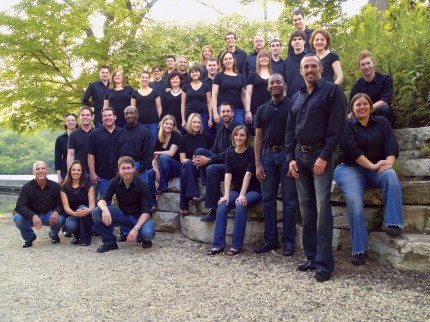Chicago Chamber Choir and friends take ambitious journey through music of war and peace

The Chicago Chamber Choir opened its 15th season Sunday with a bountiful program of works devoted to the somber subjects of war and peace. It was a long but rich evening shared with the Milwaukee Choral Artists, a superb women’s ensemble, who performed with the Chamber Choir in some of the larger pieces and stood on their own in others. The program was varied and of consistently high quality throughout. Sunday’s venue was Nichols Concert Hall, at Evanston’s Music Institute of Chicago, a clean-sounding and open space well suited for this type of performance.
Timm Adams, the long-time director of the Chamber Choir, began the evening with a divided ensemble, pitting the women’s group on stage with the Chamber Choir behind the audience. The work chosen as opener was a Kyrie eleison by the Norwegian Knut Nystedt, a rapt and lovely setting that prepared the stage for what was to follow.
A full ensemble piece (a section of a larger cantata Measuring the Holy by Midwest composer Lee Kesselman) followed, which made use of Islamic and Christian texts and exploited the full sonorities of the combined choirs along with a spare use of violin and piano, played effectively by Ernie and Kristian Brusubardis.
The Chamber Choir’s own set opened with Go Down Moses, a richly voiced arrangement by Michael Tippett from his wonderful cantata A Child of Our Time. There followed several more American traditional songs in contemporary choral settings and, in an eclectic nod, the antiwar song Find the Cost of Freedom written by Stephen Stills in 1970.
Stephen Foster’s Hard Times Come Again No More was given a pure reading by the Milwaukee Choral Artists under their founder and musical director Sharon A. Hanson with violin accompaniment. They followed this up with the most challenging piece of the evening, August 1914, a tonally complex and jagged work by Milwaukee composer Joel Boyd.
Additional ambitious works presented by this marvelous ensemble included a memorial piece Harobi No Naka Kara written by New York based Kevin James for the 60th anniversary of the bombing of Hiroshima with music running from a whisper to a sob, and a Finnish recreation of authentic medieval melodies from a collection known as Piae Cantiones, arranged by Jaakko Mäntyjävi.
The full forces of both ensembles concluded the first half of the evening in a rich and cumulative work Teiksma composed for mixed chorus and women’s chorus by the Latvian composer Pteris Plakidis
For the opener of the second half of this generous program, devoted to the human cost of war and the search for peace, American composer Carol Barnett in Dance of Zálongo memorialized the heroic mass suicide of a group of women in the Greek war for independence. Her composition comprised combined choirs, percussion, piano and the syncopated rhythms of the syrtos mirroring the defiant dance of the victims as they threw themselves and their children off a cliff rather than submit to slavery.
The Milwaukee Choral Artists then took command with a set including a pair of striking and intense compositions by American composer Joan Szymko and a hushed and harmonically straightforward Buddhist-themed Prayer for Peace by Paula Foley Tillen, herself a Milwaukee native and founding member of the Choral Artists.
The Chicago Chamber Choir opted for some more familiar names in their set, and contributed a fine rendition of the well-loved Alleluia by Randall Thompson, an exquisite setting by Morten Lauridsen of a poem by James Agee Sure On This Shining Night and a jazzy and eclectic work by Illinois native Robert Applebaum called Shalom, v’shalom, v’shalom.
The combined forces wrapped up the evening appropriately with Sean Caldwell and Paul Ivory’s Hope for Resolution juxtaposing European chant with an anti-apartheid song in a vibrant and rhythmic finale.
Posted in Performances




